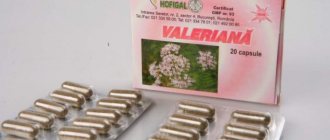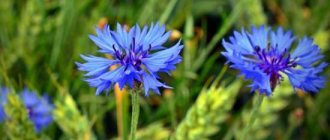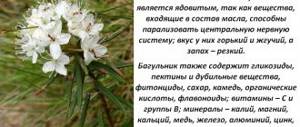What does motherwort contain?
Motherwort (cordial herb, core) is a perennial medicinal plant from the Lamiaceae family. Herbal medicine uses two types of plants: motherwort cordis and quinqueloba.
Herbs that are included in motherwort tincture
The plant is successfully used in both folk and traditional medicine to treat nervous disorders. Alcohol tinctures and tablet forms based on the extract are prepared from it.
At home, prepare a water infusion and an alcohol tincture. To prepare it, you can purchase the medicinal plant in filter bags or in the form of pressed briquettes in the pharmacy chain.
To obtain a tincture, the medicinal herb is poured with ethyl alcohol in a ratio of 1:5 and infused for a month.
This is what the drug looks like
Pure, natural alcohol composition can be bought at the pharmacy in bottles of 15 to 50 ml. It is a clear greenish-brown transparent liquid with a bitter taste.
Initially, in folk therapy, motherwort tincture was used to treat heart diseases: angina pectoris, hypertension, cardiovascular neuroses.
Later, when herbal medicine developed as a branch of medicine, it was proven that motherwort, in addition to its hypotensive and sedative effect, has the ability to normalize metabolism , while reducing cholesterol levels in the blood.
The medicinal plant contains a large amount of alkaloids, flavonoids, organic acids, tanning components, saponins, vitamins, glycosides, and sugary substances.
The medicinal plant is rich in micro- and macroelements, mineral salts and essential oils.
In addition to the fact that motherwort is used as a single drug, it is used for various homeopathic compositions.
Medicinal benefits
Motherwort cordata (common) is distinguished by pink flowers, sometimes with a purple tint. They are surrounded by spiny bracts.
Blooms in June-July. The fruit of four nuts ripens in August-September.
The heart variety is common in the European part of the Russian Federation, the Caucasus, and Western Siberia.
It grows in ravines, wastelands, along roads, near houses as a weed. After being introduced into culture, it is grown in the Volga region and Voronezh region.
Medicinal raw materials – herbs. The 40cm long tops are cut off when at least 2/3 of the flower stalks bloom in the area.
The grass is dried in the attic or in a dryer at a temperature of +50..+60C.
Store in a wooden container for up to 3 years.
Motherwort five-lobed (hairy) is distinguished by the shape of its leaves: the lower and middle ones are five-lobed, the upper ones are three-lobed.
Grows in wastelands, slopes, over cliffs, in neglected gardens, under fences. Blooms from June to late September.
Motherwort grass is harvested in August during flowering. Cut the entire plant from the bottom - where the leaves begin.
Medicinal raw materials – the top with flowering inflorescences. The benefits of faded motherwort flowers are limited.
The grass with inflorescences is dried in a ventilated room - laid out in a thin layer on a sheet of paper.
Store in boxes lined with paper inside.
Since ancient times, motherwort herb has been used to eliminate anxiety, improve cardiac activity, with a weak pulse, shortness of breath, and severe cough.
The benefits and harms of motherwort include slowing the heart rate, increasing the force of heart contractions, lowering blood pressure, reducing headaches, eliminating insomnia and increased nervous excitability, and regulating the functional state of the central nervous system. The therapeutic effect is comparable or superior to valerian preparations.
We recommend reading: How to treat the pancreas with pancreatitis (in men and women): drugs, folk remedies and diet, prevention, complications
Infusions and tinctures of motherwort are used for angina pectoris, cardiosclerosis, cardioneurosis, cerebral atherosclerosis, and menopausal disorders. Motherwort extract for epilepsy increases the intervals between seizures.
The benefits of motherwort lie in its cardioprotective, antioxidant, anti-inflammatory, analgesic, neuroprotective and antibacterial properties, which are determined by the composition of the plant.
The herb strengthens cell membranes, maintains the balance of the internal environment of the body, and prevents various failures.
Motherwort does not immediately show its medicinal benefits, so the dose is selected individually.
The recommended daily dose has not been established. The European Medicines Agency advises taking no more than 3g of the powdered extract per day.
pharmachologic effect
The spectrum of action of the medicinal plant is wide. It is used to treat neuroses of various origins:
- autonomic neurological disorders;
- neurological disorders of the gastrointestinal tract;
- throat neurosis;
- respiratory neurosis;
- bladder neurosis;
- muscle neurosis;
- cardiovascular neurosis:
- climacteric neurosis.
The tincture is taken for insomnia
Motherwort tincture is used for the complex treatment of menstrual disorders, cardiosclerosis, insomnia, and osteochondrosis.
How does a medicinal plant work? Motherwort has hypotensive, antispasmodic, anticonvulsant, tonic and antidepressant effects .
To relieve nervous excitability, at the initial stage of hypertension with vascular neuroses, a medicinal herb is prescribed in the form of an infusion. It is prepared at the rate of 20 g of dry herb per half liter of water .
This infusion is taken for insomnia and as a sedative. For stomach and intestinal cramps, prepare freshly squeezed juice from a medicinal plant, which is taken 40 drops three times a month.
As an additional treatment, an alcohol tincture of a medicinal plant is used for neuroses, tachycardias, myocardiopathies and shortness of breath.
Video about the medicinal properties of motherwort:
Traditional medicine also uses tableted extracts of medicinal plants in the neurotropic preparations “Motherwort forte” and “Motherwort P” with a sedative effect.
Tablet forms are convenient to use and are taken three times a day for two weeks. “Motherwort forte” from Evalar is supplemented with vitamin B6 and magnesium carbonate.
What does traditional medicine offer?
Motherwort has been familiar to folk medicine for a long time, so it offers more than one healing recipe prepared with its participation. Most often, a decoction, infusion and tincture are prepared based on the plant; less often, the culture is used in the form of tea. The literature also describes the beneficial properties of motherwort honey.
To prepare an effective sedative, you should take a tablespoon of crushed herbs and pour a glass of boiling water over it, then leave and thoroughly remove any remaining plant mixture by straining through gauze or a strainer folded several times. The finished decoction should be taken 20-30 ml 3-4 times a day until the symptoms of increased excitability and nervousness disappear. Naturally, before taking motherwort decoction, you must consult with specialists.
Melissa will also help calm the nervous system. Melissa tincture and tea are one of the best sedatives that are used for neuroses, depression, and sleep disorders.
How to brew motherwort correctly so that it really benefits the body. To do this, you should take raw materials collected in the summer months, when the plant is in a state of active flowering. Dried herbs cannot be stored for more than three years. It is advisable to use fresh herbal infusions to prepare the products.
A decoction of fresh motherwort will bring more benefits to the body.
Tea with motherwort is used quite rarely in folk medical practice. More often, patients suffering from cardiovascular diseases and nervous disorders drink herbal infusions, which include motherwort. For example, for insomnia, motherwort is brewed as a tea along with chamomile and St. John's wort, and for high blood pressure, motherwort is recommended to be used in combination with hawthorn and cucumber.
Does motherwort increase or decrease blood pressure? Does motherwort help with high blood pressure? Similar questions are often found on forums on the Internet.
It has been proven that the active substances in the plant can lower blood pressure, so an infusion of the herb is often prescribed to patients with mild forms of hypertension as the main means of correcting the pathological condition.
Motherwort taken at night allows you to normalize blood circulation, reduce vascular tone caused by vegetative-vascular disorders and eliminate the manifestations of hypertension. Motherwort and valerian together have a good effect on the body.
Motherwort tincture: benefits and harms
The main quality of the medicinal plant as a natural antidepressant is that it has a calming and relaxing effect, but does not affect mental clarity.
Most often, tincture from a medicinal plant is used as a sedative.
Motherwort contains substances that affect the transmission of nerve impulses and inhibit them.
Glycosides with flavonoids strengthen vascular walls and act as antidepressants.
Motherwort tincture is included in complex therapy for the treatment of withdrawal syndrome in alcohol, nicotine, and drug addictions .
The antispasmodic components of the medicinal plant relieve spasms of smooth muscles and eliminate tension and pain . Motherwort is also used as an anticonvulsant.
Benefits of the medicinal plant:
- reduces blood pressure;
- improves sleep quality and promotes falling asleep quickly;
- has a positive effect on reproductive function;
- relieves nervousness and pain during premenstrual syndrome;
- regulates the level of stomach acidity;
- relieves spasm of intestinal smooth muscles;
- eliminates increased psychomotor excitability.
The effect of drugs based on medicinal herbs is not immediately visible. The period of treatment with medicinal herbs is usually long, and the therapeutic effect does not appear immediately.
But to avoid an overdose, it will be better if the dosage for using motherwort is selected by the attending physician, taking into account the nature of the disease, the severity of the symptoms, and concomitant pathologies.
General description of the grass with photo
Motherwort is a perennial plant that grows in wastelands, along roadsides, near railroad tracks, in ravines, clearings and meadows. The plant is also called heartwood and dog nettle. As you can see in the photo, the grass is unremarkable in appearance.
We recommend reading: Is it possible for a nursing mother to undergo fluorography, x-rays?
Depending on the type, motherwort reaches from 30 cm to 2 meters in height. The leaves of the plant, which are attached to the stem by small cuttings, are covered with villi, dark green above and slightly grayish below. The lower leaves are much larger than the upper ones. In appearance they resemble five-leaf leaves.
The flowers of the core are small. They gather in inflorescences resembling a spikelet. Flowers can be located at the top of the plant and on the branches of the stem. The color of the inflorescences depends on the type of plant. The medicinal motherwort, native to Russia, has pink or light purple flowers.
The grass blooms from early summer to autumn. After flowering, fruits are formed in place of the flowers, which resemble 4 grains. They fall off and new plants grow from them next year. For medical purposes, the upper part of the plant is collected during the flowering period along with the leaves and inflorescence. After collection, the grass is dried in dark and well-ventilated places.
Herbs must be mixed in equal proportions. For infusion, take 2 tbsp. spoons of the mixture and pour 2 glasses of water brought to a boil. The mixture is infused for 120 minutes. Take the infusion ½ glass three times a day.
For nervous system disorders:
- 1. Valerian root - 1 part
- motherwort grass - 1
- cumin fruits - 1
- fennel fruits - 1,
Pour one tablespoon of the mixture into 1 cup of boiling water and leave for 30 minutes. Take 1/2 cup 3 times a day for nervous agitation and rapid heartbeat.
- 2. Valerian root - 1
- hawthorn flowers – 1
- motherwort grass - 1
- mint leaves - 1
- mistletoe herb - 1,
2 tbsp. l. pour 0.5 liters of boiling water over the mixture and leave for 3 minutes. Take 3/4 - 1 glass in the morning and at night for increased irritability and insomnia.
for catarrh of the large intestine, edema:
1. Herbal infusion : 2 tbsp. l. Pour a glass of boiling water over chopped motherwort herb, leave for 30 minutes, strain, squeeze. Take from 1 tbsp. l. up to 1/4 cup 3 - 5 times a day 30 - 40 minutes before meals.
2. Tincture of motherwort herb : take 40 ml of fresh motherwort herb juice, add 60 ml of 40% alcohol or vodka, leave in a dark place for a week, strain, squeeze. Take 30-40 drops, dissolved in 1/3 glass of water. Take 3 - 5 times a day before meals.
3. Juice from motherwort grass : take fresh grass, squeeze out the juice. Take 30 - 40 drops 3 - 5 times a day before meals.
Indications for use
Recommendations
Preparations based on motherwort are prescribed to adults and children mainly as a sedative.
In addition, a tincture from a medicinal plant is taken for irritability, loss of strength, chronic fatigue, emotional stress, migraines and frequent hysterical attacks.
Motherwort tincture is used as an adjuvant for the treatment of arrhythmias and tachycardias.
Motherwort is a good and effective medicinal plant for maintaining the elasticity of blood vessels. Motherwort tincture is used to prevent atherosclerosis and angina.
In pediatric practice, motherwort infusions are used to treat hyperactive children and children with “restless child” syndrome.
Contraindications
should not be used primarily with individual intolerance.
Motherwort tincture should be used with caution by people prone to allergic reactions.
Motherwort and preparations containing it should not be used by pregnant women. Motherwort tincture stimulates uterine contractions and can cause bleeding.
The tincture from the medicinal plant should be used only in a clearly prescribed dosage. If nausea with vomiting, diarrhea, dry mouth, muscle pain appear, all these signs may indicate overdose and abuse. In this case, the drug with motherwort should be discontinued.
The medicinal plant is strictly contraindicated for those with low blood pressure, bradycardia, gastric ulcer, duodenal ulcer.
A tincture of a medicinal plant can cause relaxation and drowsiness, so it should not be used by those whose professional activities depend on increased concentration.
For people with thrombosis and thrombophlebitis, treatment with tinctures and infusions of medicinal herbs should be carried out under the supervision of a physician .
Parents should remember that motherwort for children, its dosage and duration of administration must be prescribed by a pediatrician .
Motherwort tincture should not be used together with sleeping pills and painkillers. They enhance each other's effects, and this can lead to undesirable consequences in the form of depression of vital nerve centers.
General information
Motherwort is a perennial or biennial plant. It grows, for the most part, in wastelands, often next to nettles. Preparations made from this plant are widely used in both official and folk medicine. Today we will talk about motherwort tincture, the benefits and harms of which are not known to everyone. At the same time, when treating any disease, it is necessary to study in more detail the properties and characteristics of certain drugs.
Motherwort infusion is widely known even to those people who are not associated with medicine in their professional activities. At the same time, not everyone can use this drug with maximum efficiency, because does not fully know about its beneficial qualities and the contraindications associated with its use.
Treatment of osteochondrosis with motherwort tincture
The choice of medicinal plants and their combinations for osteochondrosis should be considered as an additional, auxiliary method
In the treatment of osteochondrosis, medicinal herbs are presented quite widely: as painkillers, absorbents, improve metabolism and anti-inflammatory.
Especially when treatment with synthetic drugs does not give the desired effect, and long-term treatment is required.
This is especially true for the recovery period.
Motherwort tincture for osteochondrosis relieves psycho-emotional stress and irritability, improves sleep and moderately relieves pain .
During the period of exacerbation of osteochondrosis, preparations with motherwort are ineffective.
Only professional techniques using synthetic drugs and physiotherapy can eliminate pain and restore mobility
Read more about physiotherapeutic procedures for spinal osteochondrosis here.
Instructions for using motherwort tincture and infusion
In order for a medicinal herb to have a therapeutic effect, it must be taken according to the rules and strictly adhere to dosages.
Basic recommendations:
- tincture and infusion of a medicinal plant must be diluted or washed down with water;
- tincture and infusion of motherwort should be taken before meals;
- optimal number of doses per day: 3-4 times.
If motherwort tincture is used to treat heart rhythm disturbances, it should be taken 25 drops three times a day for a week. Before use, the tincture of the medicinal plant must be diluted in three tablespoons of water , drunk and be sure to lie down.
For neurosis-like conditions and osteochondrosis, the dose of tincture is 40 drops three times a day. 40 drops of tincture is a dose per dose that should not be exceeded.
Summarize
- Motherwort is an herb that has been used for thousands of years by those who want to reap the benefits of its potential health benefits, especially in relation to heart health and anxiety.
- However, there are no studies of its effectiveness and safety in humans. Thus, more research is needed before it can be recommended for medical purposes.
- If you want to try motherwort, talk to your doctor first. You can find tinctures and teas at local specialty stores, pharmacies, or online.
Tags: Motherwort
- Related Posts
- What is Mulungu? Benefits, applications, side effects
- What is guayusa? Everything you need to know
- 8 Health Benefits of Curry Leaves and Their Uses
« Previous entry
Analogues substitutes
Among the medicinal herbs close to the action of motherwort are valerian and passionflower. They also have a calming, relaxing and hypnotic effect.
Motherwort is also included in complex sedative preparations . They are prescribed for sleep disorders and psycho-emotionally unstable conditions.
Alora . Manufacturer: Nobel Ilach Sanai (Türkiye). Belongs to the group of sedative and hypnotic drugs. The main active ingredient is passionflower extract.
It has a calming effect and is indicated for depression, stress, nervousness, and disturbed sleep.
Recommended for patients suffering from vegetative-vascular dystonia, hypertension, cerebral vascular crises, post-infectious asthenia.
Sedaphyton . Manufacturer: Fitofarm JSC (Ukraine). Main active ingredients: valerian rhizome, motherwort, hawthorn fruit.
Indicated in the treatment of neurotic disorders with irritability, feelings of fear, anxiety, increased fatigue, and inattention.
You can read about fears and depression in cervical osteochondrosis in this article.
Recommended for headaches, sleep disorders, desmenorrhea and menopausal syndrome.
Sedavit . Manufacturer Galichfarm (Ukraine). Belongs to the group of sedative and hypnotic drugs. Main active ingredients: rhizome and root of valerian, hawthorn fruit, St. John's wort herb, peppermint.
Recommended for states of mental stress, neurasthenia, neurasthenic reactions with irritability, anxiety, fear, fatigue, inattention, impaired memory, mental exhaustion.
The drug is also prescribed for neurocirculatory dystonia, arterial hypertension, asthenic syndrome, dermatoses, and cephalgia of various origins.
Persen Cardio. Manufacturer FC Lek, Sandoz, Slovenia. Main active ingredients: passionflower extract, hawthorn leaf and flower extract. The drug is indicated for mental overload, agitation, and insomnia.
Persen Cardio has a beneficial effect on the conduction of cardiac impulses, has a beneficial effect on coronary circulation, relieves attacks of arrhythmia, and has a moderate hypotensive effect.
Prescribed for vegetative-vascular dystonia, functional disorders of the heart and neuroses.
Reviews
Margot, 32 years old: I tried a lot of sedatives. But when a stressful period occurred, which resulted in insomnia, constant irritability and tearfulness, I tried motherwort tincture. Regular bottle, low price. Of course, the smell and taste are not very good, but you can tolerate it. The calming effect was not felt immediately, but in the evening I quickly fell asleep and slept until the morning. During the week that I drank motherwort tincture, I became calmer. In general, the sedative effect of this herb is quite good.
Elena, 44 years old: Motherwort tincture really calms you down when you are in a stressful situation and your nerves are on edge. At one time I took Novopassit, everything seemed to suit me. But it’s a little expensive, so I switched again to the old time-tested tincture.
Boris, 47 years old: Motherwort tincture is a good, simple, reliable and inexpensive remedy that should be in every home medicine cabinet. In liquid form, motherwort tincture begins to act quickly. Helps in stressful situations and when the head starts to hurt from cervical osteochondrosis.












